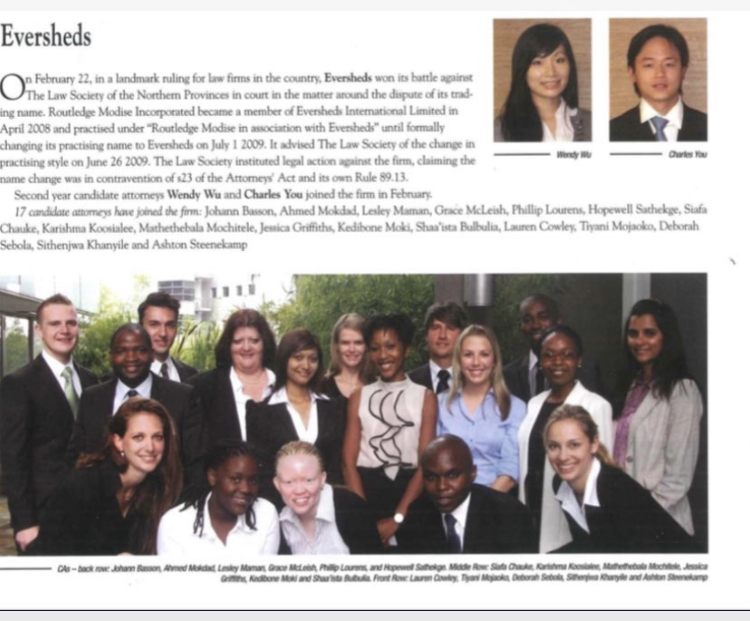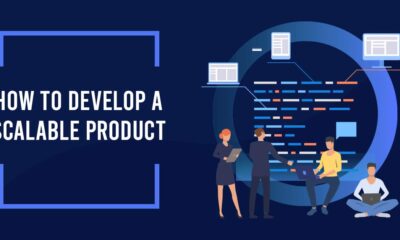Legal Business
Tiyani Majoko: New York City based legaltech startup Founder on 10 years in the legal industry

Tiyani Majoko is a lawyer and the Co-founder of New York City based legaltech startup Anü, a legal services marketplace. She is experienced in product design, identifying customer segments (user and buyer personas), data analysis and Agile. Tiyani talks to Alaba Ayinuola on her 10 years journey in the legal industry, starting from Biglaw, to in-house counsel, to running a small firm, to starting a legal tech company and I am always exploring something new. Excerpt.
In the beginning:
Life in Biglaw
On 3 January 2011, I pulled up to 22 Fredman Drive which were the offices of Eversheds (now Hogan Lovells). It was my first day at work as a Candidate Attorney, a 2-year journey as an apprentice in a law firm which culminates with passing the attorney bar/board exams. I bounced out of bed both nervous and excited that I was taking the first step in my career. I asked my dad to help me iron my outfit for the day; white shirt and black slacks, then I tied back my dreadlocks and put on my sensible black heels that he had bought me.

My dad, who is also a lawyer, was visibly beaming that I had been selected as a Candidate Attorney at an international law firm and I was following his footsteps. He had taken 2 weeks off to help me furnish my apartment, get comfortable with the route to work (though I didn’t have a driver’s license yet) and settle into my new life as a solicitor. Then he returned to his own law firm and practice in Zimbabwe.
At the end of orientation week, I knew the law firm life was not for me. I started my first 8 months rotation in a litigation team, where the only highlight of that rotation was the team and free lunches at advocates chambers. During that rotation I may or may not have forgotten to go to court to note a judgment. The daily time sheets, indexing and pagination of court files, carting files up and down to advocates offices for a 0.4 time entry and forced interactions at month end drinks were the bane of my existence. People would look forward to, or dread, the month end billing report as it revealed who was rising or bubbling under budget.
It was only later when I learned what really matters isn’t what you bill, but what you invoice and eventually collect!
I also learned about office politics and the power players of the firm if you wanted to be offered a position as an associate at the end your 2 year period as a Candidate Attorney.
The rainmaker whose team operated by its own rules (coming in at 10am and leaving at 4pm), the partner who had been at the firm all his 40 year career, the partners who struggled to make budget and how we all tried to stay away from them because they wouldn’t be in a position to retain you as an associate. There was also the partner who never took on a female or black associates, the partner who only took on LGBTQ associates and so I made a concerted effort to join the team of the partner who only took on Black associates.
She ran the mining team, working with international mining companies in helping them to obtain and retain their licenses to operate. This was the first time I felt like I was doing something I enjoyed- it was an all Black, female team. We would go on long road trips to visit mining clients, communities or regulators. I got to spend a lot of time out of the office- away from my time sheet, going to mines and meeting regulators- often these trips would allow for some sight seeing, such as visiting the Big Hole in Kimberly and going underground in a coal mine.
“As a mining lawyer I felt like I was doing something important by contributing to the development of communities. I got my first glimpse into politics in the wave of Marikana, investigating unsafe working conditions, developing environmental plans for rehabilitating mine property, working with corporate executives to understand their strategy and the adrenalin of speeding down the N1 from Joburg to Pretoria to meet arbitrary regulator deadlines for various submissions.“
I loved the centrality of the role and how each matter brought new challenges.
Each client had a different problem and the partner I worked for gave us free rein on matters. This built my professional confidence to execute and communicate as a professional. Although she would manage the relationship with the client, I would send the emails, they clients would call me if they had questions, etc. My criticism of the team was that it was too familial for a work environment and we could have used more intelligent tools to track matters, create reports and be efficient- which would have helped us to bill more. In 2013 the Black bubble was burst and the gang broke up.
Throughout my career I wanted to maintain that feeling of being connected to people, processes and policies while creating a product that’s profitable.
Going In-House
After Biglaw, I tried a couple of different things. I went in-house in an oil and gas company, where my boss lived in Durban and I was based in Joburg- so basically I have been remote since 2013. It was my first time working alone, after being accustomed to an office with 400 lawyers. I had to learn to trust my work, be thorough, do research and create my own support network of mentors. I was running legal and business affairs- so I would put together decks, find co-investors on projects and lead meetings after a short phone call with him. He was part of the young, new money Black elite that had made money from government contracts and had former President Jacob Zuma on speed dial. He opened my eyes to a whole class of Black, young, rich entrepreneurs that traveled to Bali on private jets. In those environments I quickly learned how political favor is volatile and qualifications to do the work are optional. At the time Zuma was ousted, a lot of them- including my boss- went broke.
Starting Out
I was 5 years into my career and had been disappointed by employers, so I made a bet on myself. I had some savings, worked out a rent free living situation and talked my varsity best friend into starting one of the first legal consulting firms in South Africa. I learned about finding clients, keeping clients, expanding revenue streams, business models, leadership, networking and expansion. We were so adorable when we started, see our launch video below.
I also launched Africa’s first lawyer on demand service. As a founder, I was able to find that feeling again, but I quickly realized that our service was too manual for scale in a way that mattered. Part of it was not knowing what tools we could use for a small services focused businesses and as I set my sights on moving away from a lifestyle business- I knew that technology would essential to our success. I was 8 years into my career at this point, running a good profitable company and contemplating the hard pivot to grad school in a foreign country, with a 6 figure price tag.
Starting Up
Ultimately I made the decision and attended Cornell with the vision of going back to my business then things changed. Instead, I become a founder- again- which I wrote about here.
While in school I thought of becoming a Product Manager, however it wasn’t presented to the law students as a career option, it was solely for Engineers and MBAs. Initially, I didn’t care because I didn’t understand most technical terms and I was just trying to keep up with my own course work. In January 2020, the blitz interview season was upon us, the technical students and MBAs were filling up their diaries so fast and law students were high key scrambling. I started to look at the PM job requirements and I was like “Hey, I know this stuff.. well some of it.” I went to the career services office like:
I have always been of the opinion that whatever an MBA graduate can do; a lawyer can do- just with a calculator.
I was benched very hard and told to stay in my lane- to look for roles in legal tech companies- maybe doing business development, or sales if I no longer wanted to practice law.
If the school didn’t see what I saw for myself, then I had to make it happen. All this was happening on the backdrop of a Coronavirus outbreak, BLM protests and many graduates being unable to find work. I half-heartedly applied for jobs, while I turned my full attention to a class project that had some real-world traction. When I went full time with Anü, I looked at this as an opportunity to do 2 things — either run a successful tech startup or have enough skills to rebrand myself as a PM. Either way I was setting myself up to win.
Next
My 5th pivot is loading as I am staring down another path. It’s less scary because I have learned how to get good at taking wild bets on myself adaptability. In contrast, my father has been a lawyer his entire life. He graduated from law school 32 years ago, each year he has renewed his practicing license and I honestly envy him for finding the thing he is good at, that he also enjoys. I enjoy certain aspects of the law, but not all the ways that it is practiced. I need room to experiment, to be playful and to also not always follow precedent. I am extremely blessed because my dad has supported these expeditions. Now it’s time for his investment to pay off.
5 Tips on Making Career Pivots
- Create A Big Vision for Your Life.
- Be Intentional About Skills To Acquire.
- Know Your Core Competency.
- Network Like Crazy.
- Community (I created The Legal Werk for mid-career legal professionals who want to make a pivot, switch, climb or reset their careers to have a source of support.) If you want to join us sign up for updates here.
- Know Your Tolerance for Pain.
- Have Faith.
Visit Anü
Legal Business
Morenike George-Taylor: The fundamental term to include when raising investment

Morenike George Taylor, Founder Reni Legal Consulting | County Support Consulting (Image: Supplied)
I remember a pivotal moment in my career that taught me a profound lesson about the importance of securing sufficient funding for a project. It all started when my team and I were working on an ambitious venture, a hotel to be located in Lekki, a high brow area in Nigeria. After months of planning, I found an investor who was excited about the potential. He assured me that he would provide the necessary funds to bring our vision to life.
Initially, the investor invested a portion of the money, which gave my team and I a glimmer of hope. With that commitment, I felt a surge of confidence. We began allocating resources, hiring a team, and setting timelines. Everything seemed aligned for success.
However, as we progressed, the promises began to wane. The investor started delaying further payments, citing various reasons that ranged from market fluctuations to unforeseen personal issues. Each time I reached out for updates, I was met with assurances that the funds would come through soon. Then, midway through the project, the investor informed me that he could no longer fund the project.
This sudden withdrawal created a domino effect. We had already committed to other businesses that were relying on our funding to get started. As the primary business was still in development, those secondary businesses began to pressure me for repayments. They had their own obligations, and without the promised funds, they found themselves in a precarious position. It was an overwhelming situation, and I watched helplessly as relationships soured and trust evaporated.
The main business, which had so much promise, struggled to survive. Without the necessary capital, we couldn’t complete our operations or deliver our product to market. As the financial strain mounted, it became clear that our venture was on the brink of collapse. Ultimately, the business we had worked so hard to build didn’t make it.
This experience was a harsh but invaluable lesson. It underscored the critical importance of raising sufficient funding before embarking on any ambitious project and how this needs to be taken into consideration in any contract documentation you sign. If I had tied all our contracts and obligations to the complete funds being raised, we could have safeguarded our operations against such unforeseen circumstances.
This experience taught me that in business, clarity and preparation are paramount. Without sufficient funding, dreams can quickly turn into nightmares, and projects that hold so much promise can fade away before they even have a chance to succeed
In the world of business, securing adequate funding is crucial for success. Particularly, if you require $1,000,000 for example to execute your vision, it is essential to raise that exact amount and tie all your contracts to this figure, especially concerning repayment terms. This approach ensures that your business can commence operations without financial strain.
When you set out to raise capital, clearly defining your financial needs is the first step. If you determine that your project requires $1,000,000, raising exactly that amount helps avoid unnecessary complications. Insufficient funding can lead to a cascade of operational issues, including delays, inability to meet contractual obligations, and ultimately, project failure. By securing the full amount, you create a solid foundation for your business operations.
Tying your contracts to the $1,000,000 funding goal is a strategic move. This means that all agreements—whether with investors, lenders, or partners—should explicitly state that the commencement of business activities, as well as repayment obligations, are contingent on successfully raising this amount. If the funding goal is not achieved, the repayment terms should reflect that the business cannot commence. This protects you and your stakeholders from the risks associated with undercapitalization.
By ensuring that all agreements explicitly stated that the project’s commencement and the repayment terms hinged on successfully raising that target amount, we would have mitigated the risks of undercapitalization. It became clear to me that having a well-structured funding strategy is not just a financial necessity; it’s essential for operational stability and long-term success.
Now, I always emphasize to entrepreneurs the importance of securing the full amount required before diving into a project. A well-capitalized venture is not just better positioned to navigate challenges; it can seize opportunities and grow sustainably.
About the author:
Morenike is an award winning business strategist and the founder of Reni Legal Consulting and County Support Consulting. She operates as a business consultant across various sectors, leveraging her extensive expertise to provide strategic insights and tailored solutions. With a keen understanding of the complexities of different industries, she helps organizations navigate challenges and seize opportunities for growth.
As a qualified lawyer, Morenike combines her legal knowledge with a strong foundation in data management, agile methodologies, and risk management. She is a certified Data Management Professional, a Disciplined Agile Scrum Master, and a Risk Management Professional. This diverse skill set allows her to approach each consulting engagement with a comprehensive perspective, driving operational efficiency and fostering organizational success.
Legal Business
African Union, Google and Africa Practice launch Policy Framework to Transform Africa’s Startup Ecosystem

In a groundbreaking move to drive innovation and entrepreneurship across Africa, the African Union and its partners, including Google and Africa Practice, have launched the AU Startup Policy Framework and Model Law. The Policy Framework and Model Law articulate principles, recommendations, and policy innovations to tackle the challenges hindering startups in Africa. It provides specific sample clauses to guide African Union Member States in developing or updating their national startup legislative and regulatory governance arrangements.
The Policy Framework and Model Law, developed in cooperation with Google in line with its Memorandum of Understanding with the African Union Commission, is set to harmonise approaches to enabling startups and innovation, in line with the African Union’s broader harmonisation objectives.
Speaking during the launch held during the African Union 6th Mid-Year Coordination Meeting that brings together the African Union, the Regional Economic Communities, the Regional Mechanisms and the African Union Member States, H.E. Albert M. Muchanga, African Union Commissioner for Economic Development, Trade, Tourism, Industry and Minerals, said, “We are excited about the new prospects for our continent unlocked by the adoption of the Startup Policy Framework and Model Law which is set to leapfrog the startup ecosystem in Africa. As you know, small and medium-sized enterprises, including startups, represent most businesses in all sectors and are the primary source of job creation. Specifically, startups spur development by creating jobs in the digital economy, employing 34,000 people across the continent. Unfortunately, out of 1000 unicorns globally, only seven are in Africa. This is primarily due to complex regulations, limited funding, a scarcity of skilled labour, and fragmented markets in Africa. Therefore, the framework is expected to unlock some of these hurdles and set a strong foundation for the growth of Africa’s startup landscape, projected to expand to USD 10 billion by 2056.”
H.E. Albert M. Muchanga went on to highlight that “Africa is a young continent, by 2050, the continent will account for 25% of the global population. Governments need to make the provisions to enable capital flow for the burgeoning ideas coming out of Africa. We need to create an environment that enables these innovative minds to catapult the continent to economic prosperity, and this framework is what enables this.”
Google’s Regional Director, Sub Saharan Africa, Government Affairs & Public Policy, Charles Murito, noted, “Africa receives a disproportionately small share of global venture funding. In 2023, the continent raised a total of USD 4.5 billion from 545 disclosed venture capital deals, reflecting a 30% decrease in value and a 31% decline in the number of deals compared to 2022. Notably, 16% of the funding recipients were female-led ventures, only marginally up from 11% in 2020. Funding flows also skew towards the same sectors, exacerbating the financing challenge; with fintech continuing to lead deal volumes. The same destinations also receive disproportionately more of the financing flows into the continent: startups in Nigeria, Kenya, South Africa, and Egypt received 62% of the total deal volume.”
While there’s no universal formula for fostering innovation and startups, the framework outlines principles derived from successful models. It is a call to action to ensure that startups — particularly those led by women and youth can be better supported. This Policy Framework and Model Law holds the potential to address gender disproportionality in financing flows, inspiring a new wave of innovation and growth.
Marie Wilke, the Chief Innovation Officer at consulting firm Africa Practice, said, “The adoption of the Startup Policy Framework and Model Law marks the beginning of an exciting but potentially transformative phase. We must maintain momentum behind engagements with regional economic communities (RECs), regional organisations (ROs), and member states, to update and enact regional legal frameworks and national laws. Innovation is as much about finance and people as it is about drive. The future of Africa’s small and new businesses depends on our joint and decisive efforts to support them, paving the way for The Africa We Want.”
Legal Business
The Legal Lore: Taking us from the bench to the fireside

Photo Credits: Tonkin Clacey Inc
In the complex and intricate world of law, where every case is a story waiting to be told, the wisdom passed down from seasoned legal professionals holds immeasurable value. Within the hallowed halls of law firms and legal institutions, an age-old tradition persists-one that transcends formal training and case law. It’s the tradition of fireside chats, where senior legal practitioners weave narratives of their experiences, trials, and triumphs, igniting the flames of inspiration in the hearts of their junior counterparts.
In these intimate gatherings, the rigid walls of hierarchy crumble, and the barriers between senior and junior practitioners’ dissolve. Here, amidst the flickering glow of the fire, stories untold-stories of courtroom battles won and lost, negotiations that sealed deals or unraveled, and ethical dilemmas faced with unwavering resolve. Through these stories, senior legal practitioners impart not just legal knowledge but invaluable lessons from the trenches of practice.
For junior practitioners, these fireside chats serve as a beacon of guidance, illuminating the path ahead with the collective wisdom of those who’ve walked it before. They chats provide insights that textbooks can’t convey, painting a vivid picture of the complexities and nuances of legal practice. From navigating tricky client interactions to finding creative solutions to legal challenges, the stories shared in these informal gatherings offer a treasure trove of practical advice.
Moreover, fireside chats help to build a sense of fellowship and community within the legal profession. They create spaces where junior practitioners feel seen, heard, and valued—not just as legal novices, but as aspiring storytellers in their own right. Through the exchange of anecdotes and experiences, bonds are forged, mentorship relationships blossom, and a culture of continuous learning thrives.
Most importantly, these chats have the power to shape the trajectory of junior practitioners’ careers. By exposing them to diverse perspectives and real-world scenarios, these informal gatherings expand their horizons, instilling in them the confidence to navigate the complexities of the legal landscape. They inspire them to dream bigger, reach higher, and aspire to leave their own indelible mark on the legal profession.

Photo Credits: Baker McKenzie
In a profession where the stakes are high, and the journey is fraught with challenges, storytelling becomes a guiding light—a compass that points towards excellence, integrity, and justice. The Advancing Women in the Workplace (AWW) program- a program to support women in leadership in South Africa adopted this approach of storytelling as a model. So, let us gather around, dear practitioners, and share our stories. For in the flicker of the flames lies the power to shape not just individual careers, but the future of the legal profession itself.

Acknowledgements
The AWW program, a program sponsored by Vance Centre in partnership with the South African Legal Fellows Network and the US mission.
Written by: Adaobi Adaobi Egboka and Dr Kim Lamont-Mbawuli. Africa Program Director, Cyrus R. Vance Center for International Justice, Vance Center Consultant and Director of KLM attorneys.
-

 Afripreneur1 day ago
Afripreneur1 day agoOluchi Anoruo on building SmartPharm and addressing access to healthcare products
-

 Afripreneur1 day ago
Afripreneur1 day agoRedefining Real Estate Marketing: An Interview with Imelda Usoro Olaoye, Founder of Thinkmint
-

 Economy2 days ago
Economy2 days agoMeta Hosts its First Youth Summit in Nigeria to Drive Innovation and Empowerment
-

 Afripreneur15 hours ago
Afripreneur15 hours agoMeet Datari Ladejo, the digital strategist helping brands thrive in the digital economy
-

 Technology2 days ago
Technology2 days agoLG’s Brand Reinvention: A Global Success Story









